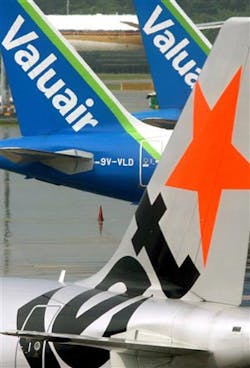SINGAPORE (AP) -- Low-cost carriers Jetstar Asia and Valuair Ltd. have agreed to merge in the first consolidation in Asia's crowded budget travel market - but will continue to operate separately for the foreseeable future as they sort out the best way to bring together their overlapping businesses.
The new Singapore-based holding company will be named Orange Star, Nick Tymms, a spokesman for the new firm said Monday.
The two airlines issued a joint statement Sunday announcing a new entity that will ''own and operate both airlines.'' They will continue to run their businesses separately ''for the foreseeable future'' until the new management works out the best way to consolidate the carriers' routes and fleets, Tymms said.
Valuair and Jetstar both fly from Singapore, their home base, to Bangkok and to Hong Kong, and each flies four Airbus 320s, which seat up to 177 people. In addition, Jetstar flies from Singapore to India, Manila and Taipei, and Valuair goes from Singapore to Jakarta and Perth, Australia.
The merger makes sense because each side had something the other lacked, said Peter Harbison, Managing Director at Sydney's Center for Asia Pacific Aviation.
Valuair, which has yet to turn a profit since it was launched in 2004, needed an injection of funds, which it could get from Australia's Qantas Airways, which holds a 49 percent stake in Jetstar Asia. Singapore government's investment arm, Temasek Holdings, controls 19 percent of Jetstar.
Jetstar, meanwhile, had failed to get approval to fly to major markets such as China and Indonesia. Valuair has landing rights in the Indonesian capital of Jakarta.
''Jetstar is essentially buying itself some routes,'' Harbison said. ''Otherwise, it just can't get any revenue.''
Qantas chief executive Geoff Dixon would become chairman of Orange Star while Jetstar Asia's chief executive Ken Ryan will also become CEO of Valuair, which is owned by a group of Singapore-based executives.
For now, the two carriers would continue flying their separate routes and charging different fares, Tymms said.
The two airlines occupy slightly different niches in that Valuair has marketed itself as something between a full-service airline and a budget carrier, targeting the young business traveler who's inclined to save costs but not sacrifice the luxury of assigned seats and onboard meals.
A Valuair return-trip ticket from Singapore to Bangkok cost 230 Singapore dollars (US$139; euro114), the company's Web site said. The same one-and-a-half hour route on Jetstar Asia cost at least S$212 (US$128; euro105.41).
Harbison said it was unlikely the move would trigger a series of other mergers or acquisitions among low-cost carriers in Asia. While rising fuel costs would be a burden on carriers, there was still plenty of demand for most carriers to survive, he said.
Southeast Asia has seen a explosion in the number of low-cost airlines serving the region over the past two years. In Singapore alone, there are three budget airlines - Valuair, Jetstar and Tiger Airways Ltd., a joint venture between Singapore Airlines Ltd. and Europe's Ryanair Ltd.
Competition is also intense in the region between Malaysia's AirAsia Bhd., Indonesia's Lion Airlines and Thailand's Nok Air Sky Asia Co. Ltd.





